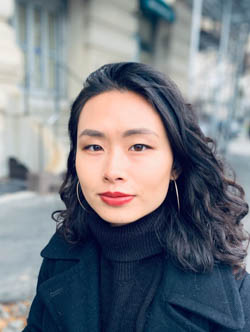Campus News
Switzer Fellowship will help graduate student engage communities in climate planning
Coastal Science and Policy Program master’s student Diana Fu won a Switzer Foundation fellowship to support her work advancing environmental justice through climate change adaptation.

Coastal Science and Policy Program master’s student Diana Fu recently won a Switzer Foundation fellowship to support her work in advancing environmental justice through climate change adaptation. The Switzer Foundation selects a nationwide cohort of 20 environmental leaders each year and provides fellowship awardees with funding for their research and studies, along with networking and professional development opportunities.
“I’m ecstatic and feeling really grateful that they chose me as one of their fellows,” Fu said. “I think what I’m most excited about is that they really pride themselves in creating a community, so I’m looking forward to connecting with the current cohort and some of the past alumni who have gone on to do great things.”
Fu applied for the fellowship program based on the strength of her professional experience, leadership capability, and commitment to the environmental field, as well as her pursuit of important research interests through her capstone project for UC Santa Cruz’s Coastal Science and Policy Program. Each master’s student spends the final year of the program embedded with a partner organization to implement a co-designed scalable solution to a coastal sustainability challenge.
For her capstone project, Fu will be working with two organizations. She’ll help the UC Climate Resilience and Adaptation Initiative to synthesize climate change vulnerability assessments and adaptation plans from cities and counties across the state, and she’ll apply what she learns to community engagement initiatives for the San Francisco Estuary Partnership (SFEP).
In her role with SFEP, Fu will start by managing a boater education and outreach program to decrease untreated sewage discharge from recreational boaters in the Lower and Upper San Francisco Estuaries. Then she’ll pivot to engaging tribal groups and historically disadvantaged local communities in development efforts for the San Francisco Estuary Blueprint, a five-year comprehensive conservation management plan that includes responses to projected sea level rise and other elements of climate change.
Fu is an educator, critical race scholar, and cultural worker as well as an environmental advocate, and she sees climate adaptation planning as an important means of supporting the frontline communities that bear the brunt of climate change impacts. Low-income communities of color are often disproportionately affected due to past systemic racism in policymaking. But Fu hopes the future could be different.
“We can use this really pivotal moment in urban planning to redress some of the past injustices that cities have done to undermine and underserve certain communities,” Fu said. “We can look at climate adaptation not just as an environmental issue, but also as an issue that incorporates things like transportation equity, racial equity, and housing; all of these facets of society that people don’t often think of as relating to climate change.”
Fu believes that addressing the major challenges the world faces today will require solutions that advance both social and environmental goals.
“For a long time in the environmental field, there was never really a focus on the people and communities that rely on natural resources, but now I think the field is really turning a page, and I hope to take my career in a direction that makes this field more equitable,” she said. “I’m passionate about the environment, but I’m just as passionate about people.”